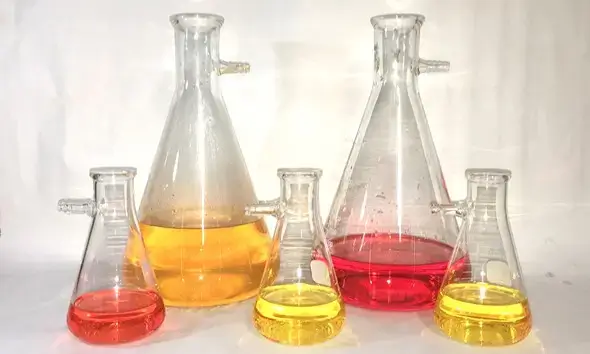TABLE OF CONTENTS
- Why is Diesel Fuel Quality Testing Important?
- What is Tested in Diesel Fuel Quality Testing?
- Standardized Testing: ASTM D975 Specifications
- Addressing Fuel Degradation
- How to Test Diesel Fuel Quality
- Benefits of Regular Diesel Fuel Quality Testing
- FAQs (Frequently Asked Questions)
- How often should diesel fuel be tested?
- What steps can be taken to improve diesel fuel quality?
- How does weather affect diesel fuel quality?
- Are there any DIY methods for diesel fuel testing?
- What should I do if my diesel fuel fails a quality test?
- Is there a difference in fuel quality requirements for different industries?
- Conclusion

Diesel fuel is vital in transportation, agriculture, and construction. Testing diesel fuel quality is crucial to ensure efficient engine performance, minimize environmental impact, and extend equipment lifespan.
Poor-quality diesel can lead to inadequate performance and equipment damage, emphasizing the significance of regular testing. The diesel quality test reveals combustion speed and stability, as well as contaminants like water and debris that can accumulate during storage, impacting fuel function.
It involves various procedures such as measuring the cetane number, assessing sulfur content, and analyzing water and sediment content. Adequate fuel quality testing ensures safe and usable fuel when needed, making it essential for fuel managers and business owners for a proper cost for their fleet management.
Why is Diesel Fuel Quality Testing Important?
Ensuring the quality of diesel fuel is crucial for maintaining peak performance and engine longevity. Let’s delve into why testing diesel fuel quality holds such significance.
Fuel Efficiency and Engine Performance
Diesel quality testing ensures complete combustion, maximizing engine power and fuel efficiency by identifying contaminants. High-quality fuel preserves engine health, averting costly repairs over time for fleet fueling to avoid expensive cost.
Reduced Emissions and Environmental Impact
To make diesel more environmentally friendly, advancements in engine technology and fuel formulations are crucial. For instance, the adoption of cleaner-burning engines and the integration of exhaust after-treatment systems help reduce emissions of pollutants like NOx and particulate matter. Additionally, utilizing alternative fuels such as biodiesel or synthetic diesel blends can further mitigate environmental impact. These strategies contribute to meeting regulatory standards and improving air quality.
Equipment Protection and Extended Lifespan
Low-quality fuel may corrode engine parts, accelerate wear, and prompt costly repairs or early failure. Common contaminants like water, microorganisms, and debris can harm engines.
Quality diesel fuel protects equipment by preventing corrosion, injector fouling, and wear caused by contaminants like water and sulfur. High-quality fuel with filtration and additives ensures clean systems, efficient combustion, and prolonged lifespan, minimizing maintenance costs and failures.
What is Tested in Diesel Fuel Quality Testing?

Testing diesel fuel quality involves assessing various parameters, including cetane number and sulfur content.
Cetane Number
The cetane number assesses diesel fuel’s ignition quality during compression. Higher numbers mean smoother operation, easier cold starts, reduced noise, and lower emissions. Typically ranging from 40 to 55, its determination follows ASTM D613 standards, which is crucial for EU diesel sold with less than 10 ppm sulfur.
Sulfur Content
Sulfur content in diesel fuel significantly impacts emissions control, engine lubrication, and after-treatment systems. Regulations like the EPA’s 15 ppm limit since 2007 aim to curb air pollution by reducing sulfur emissions. Low-sulfur diesel ensures better engine performance and prolongs the lifespan of emission control systems. Quality sulfur content is measured in parts per million (ppm) to meet environmental standards and optimize engine efficiency.
Density and Distillation
Density and distillation tests are essential in determining fuel composition, volatility, and suitability for specific climates.
Density indicates the mass of fuel per unit volume and provides insights into its composition. Fuels with higher density tend to have a higher energy content, which affects combustion efficiency and engine performance. For example, denser fuels may provide more power but could also lead to increased emissions if not combusted efficiently.
Distillation tests measure the range of temperatures at which different components of the fuel vaporize. This helps assess volatility, which is crucial for starting engines in different climates. Fuels with a broader distillation range are suitable for a variety of temperatures, while those with a narrow range may be more suitable for specific climates.
Contamination
Various impurities can contaminate diesel fuel. Contamination testing methods include visual inspection, water separation, and microbial contamination testing.
Water
The presence of water in diesel fuel can lead to microbial contamination, corrosion of fuel system components, and reduced fuel lubricity, which in turn results in increased wear on fuel system parts.
Sediment
Sediment in diesel fuel can clog fuel filters and injectors, causing engine performance issues and potential damage to fuel system components.
Microbial Content
Microbial growth in diesel fuel can lead to the formation of sludge, which can clog fuel filters, corrode metal surfaces, and cause engine performance issues.
Oxidative Stability
Conduct oxidative stability tests to assess the formation of sludge and varnish to prevent fuel degradation. Failed tests can lead to tank deposits, incomplete burning, and even engine failure. Such testing is crucial for safe fuel usage.
Standardized Testing: ASTM D975 Specifications
Compliance with ASTM D975 standards is vital for ensuring diesel fuel reliability and safety in industrial settings. These standards, encompassing seven grades and 13 tests, lay out essential fuel properties and acceptable limits. Adherence to these standards is often mandated by regulations to meet environmental and safety guidelines. Effective fuel management practices, such as regular maintenance and strategic procurement, maximize efficiency and minimize consumption. Choose solutions like Fuel Logic, providing tailored systems for optimized fuel monitoring and cost control.
Addressing Fuel Degradation
Fuel degradation refers to the deterioration of fuel quality over time, often influenced by exposure to air, moisture, and temperature fluctuations. Indicators of fuel degradation include changes in color, sediment formation, and the presence of water layers. These signs can compromise engine performance and efficiency.
Proper diesel fuel storage and handling are crucial to mitigate degradation. Preventive measures include proper storage, tank maintenance, and chemical treatments like fuel polishing. Fuel Logic provides multiple resources for maintenance and filtration.
When fuel degradation is detected, prompt replacement is advised to prevent engine issues. To minimize ecological impact, dispose of degraded fuel responsibly, adhering to environmental regulations.
How to Test Diesel Fuel Quality

Field Tests
Field tests ensure diesel fuel quality across various settings.
Dipsticks
Dipsticks gauge fuel levels and detect tank contamination. They measure levels by insertion and withdrawal, noting the fuel level at a mark. For contamination, anomalies like discoloration, particles, or water are observed. But it is limited in terms of detailed analysis.
Fuel Analysis Kit
Fuel analysis kits include test strips, containers, and sometimes reagents. They help identify specific fuel issues by submerging test strips in a fuel sample. Comparing color changes to a reference chart offers on-site testing with moderate accuracy.
Hydrometers
Hydrometers measure the density of diesel fuel, gauging its quality for optimal performance. When placed in a fuel sample, the hydrometer floats, the degree of which is contingent on the fuel’s density.
The hydrometer’s typical range varies based on the liquid under examination, such as diesel fuel with a specific gravity range of 0.82 to 0.95. If a hydrometer shows a higher density reading than anticipated for a specific liquid, it could suggest contamination.
Despite their usefulness, hydrometers might not disclose certain contaminants.
Laboratory Tests
Specialized labs utilize chromatography, spectroscopy, and filtration to analyze fuel quality, following ASTM and ISO standards. They cater to various industries and aid in quality control, research, and troubleshooting for petroleum and biofuels.
Continuous Monitoring Systems
Advanced systems offer continuous monitoring of fuel quality in storage tanks and pipelines. Utilizing technologies like ultrasonic, laser, and radar, they measure fuel levels, temperature, detect water content, and contaminants.
Interpreting Results
Effective fuel quality management requires accurate interpretation and recording of test results. Inconclusive field tests may warrant further laboratory analysis.
Benefits of Regular Diesel Fuel Quality Testing
Conducting diesel quality testing is crucial for various reasons:
Reduced operational costs
Regular fuel testing ensures improved fuel efficiency, prolongs equipment lifespan, and reduces maintenance needs, leading to operational cost reduction.
Environmental compliance
Regularly testing diesel fuel quality ensures environmental compliance by preventing the release of harmful pollutants, safeguarding air quality, and reducing the ecological impact of emissions, contributing to a cleaner and more sustainable environment.
Peace of mind and Risk Mitigation
Proactive testing prevents equipment failures and accidents due to fuel quality issues, serving as a cost-effective insurance against costly repairs and liabilities.
FAQs (Frequently Asked Questions)
How often should diesel fuel be tested?
Regularly, ideally before each use, and at least every 6 months, to ensure quality and prevent engine damage.
What steps can be taken to improve diesel fuel quality?
Use fuel stabilizers, maintain clean storage tanks, filter fuel before use, and adhere to proper storage conditions.
How does weather affect diesel fuel quality?
Cold weather can cause wax crystallization, leading to filter blockages, while hot weather can promote microbial growth and fuel degradation.
Are there any DIY methods for diesel fuel testing?
Simple tests include visual inspection for water or sediment, odor assessment, and using water detection paste for water presence.
What should I do if my diesel fuel fails a quality test?
Identify the cause, such as contamination or degradation, then take corrective actions like filtering, treating, or disposing of the fuel properly.
Is there a difference in fuel quality requirements for different industries?
Yes, industries like aviation have stricter quality requirements due to safety concerns, while others may focus more on efficiency.
Conclusion
Consistent testing of diesel fuel quality is crucial to ensuring optimal engine performance, upholding environmental standards, and extending the lifespan of equipment like your diesel generator.
By conducting regular tests and promptly addressing any potential issues, the risk of engine failures is minimized, leading to lower repair expenses and sustained fuel quality.
Contact Fuel Logic today to establish a regular testing program based on your specific needs and fuel usage patterns.

